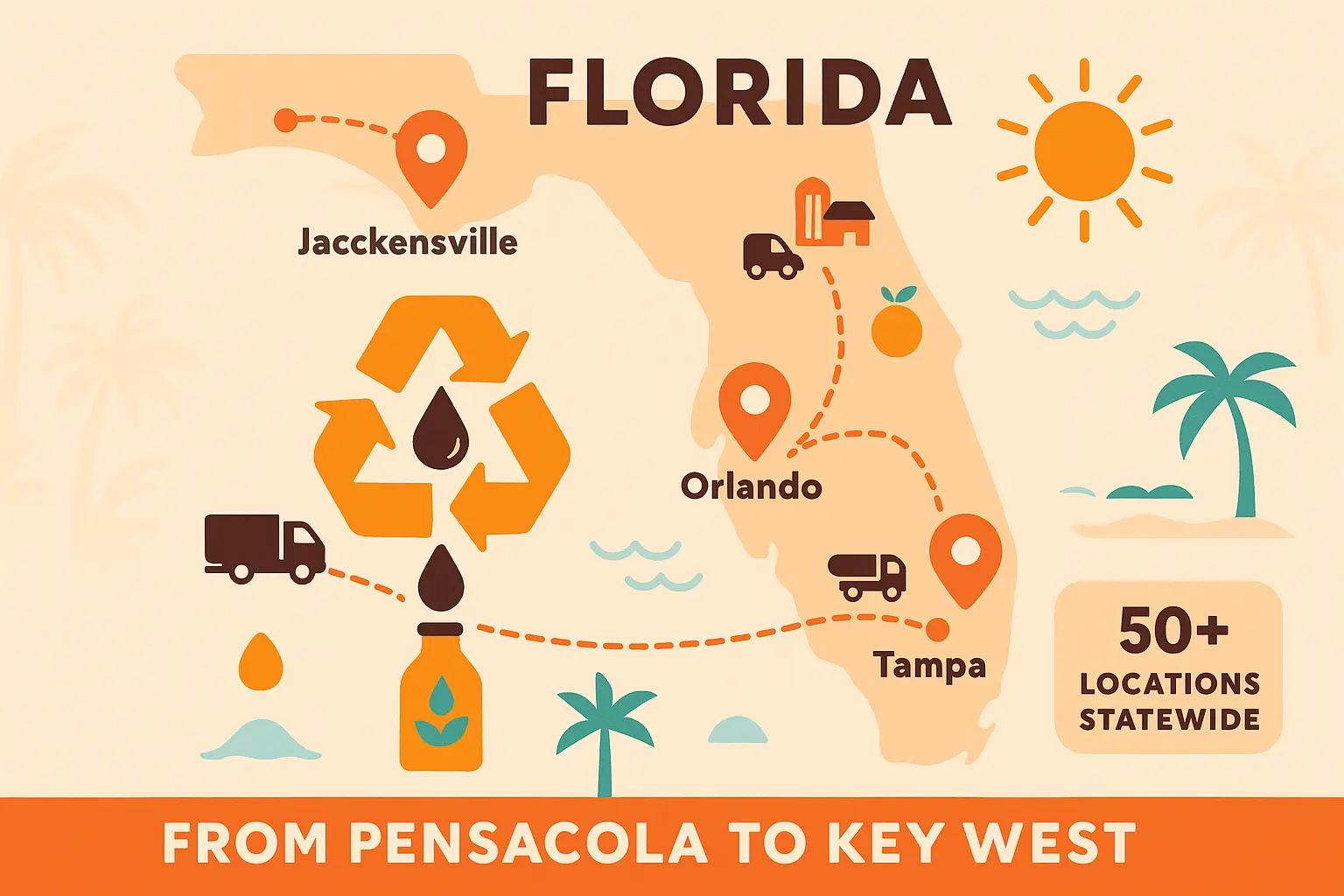Table of Contents
Highlights
- Florida residents can safely dispose of used cooking oil at Household Hazardous Waste facilities, helping prevent environmental contamination and plumbing issues.
- Commercial businesses can utilize specialized grease haulers like Grease Connections for efficient used cooking oil collection and compliance with environmental regulations.
- Proper disposal techniques for home cooks include avoiding sink drains, filtering and reusing oil, and composting suitable types of oil to promote sustainability.
Residential Drop-Off Locations
Florida residents have several convenient options for disposing of used cooking oil through Household Hazardous Waste programs, which:
- Provide dedicated drop-off locations
- Allow residents to safely dispose of their used cooking oil
- Help prevent environmental contamination
- Help prevent plumbing issues
Utilizing local Household Hazardous Waste facilities and community centers is a straightforward way to ensure that your used cooking oil is handled properly. These centers are designed to accept hazardous materials, including used cooking oil, and process them safely. Motor oil should never be mixed with cooking oil and must be disposed of separately at specialized collection points to prevent contamination of the recycling process. Education and training on proper collection and disposal methods are also provided to residents, ensuring that everyone can contribute to a cleaner environment.
Certain local recycling centers may even accept cooking oil for processing into biodiesel, turning waste into a valuable resource. Let’s take a closer look at the specific drop-off locations available in Miami-Dade County, Broward County, and Palm Beach County.
Miami-Dade County
In Miami-Dade County, residents can take advantage of two Home Chemical Collection Centers specifically designated for the drop-off of hazardous materials, including used cooking oil. These centers provide a safe and convenient way to dispose of used cooking oil, ensuring that it does not contaminate the environment.
Utilizing these collection centers helps residents ensure hazardous waste is disposed of correctly, protecting the environment and aiding community recycling initiatives.
Broward County
Broward County offers three Household Hazardous Waste Centers where residents can dispose of their used cooking oil. These centers are accessible to residents, who can make up to four visits per month to ensure their waste is properly handled.
Each of these centers accepted used cooking oil as part of their waste disposal services, making it easy for residents to contribute to environmental protection and proper waste management.
Palm Beach County
Residents of Palm Beach County can drop off liquid used cooking oil in sealed containers at any of the Solid Waste Authority’s Home Chemical & Recycling Centers. Be sure to seal the container tightly to prevent leaks and spills. This ensures that the oil is safely contained and ready for proper disposal.
Following these tips prevents leaks and environmental contamination, making it easier for the facilities to process the oil and recycle it effectively.
Commercial Collection Services
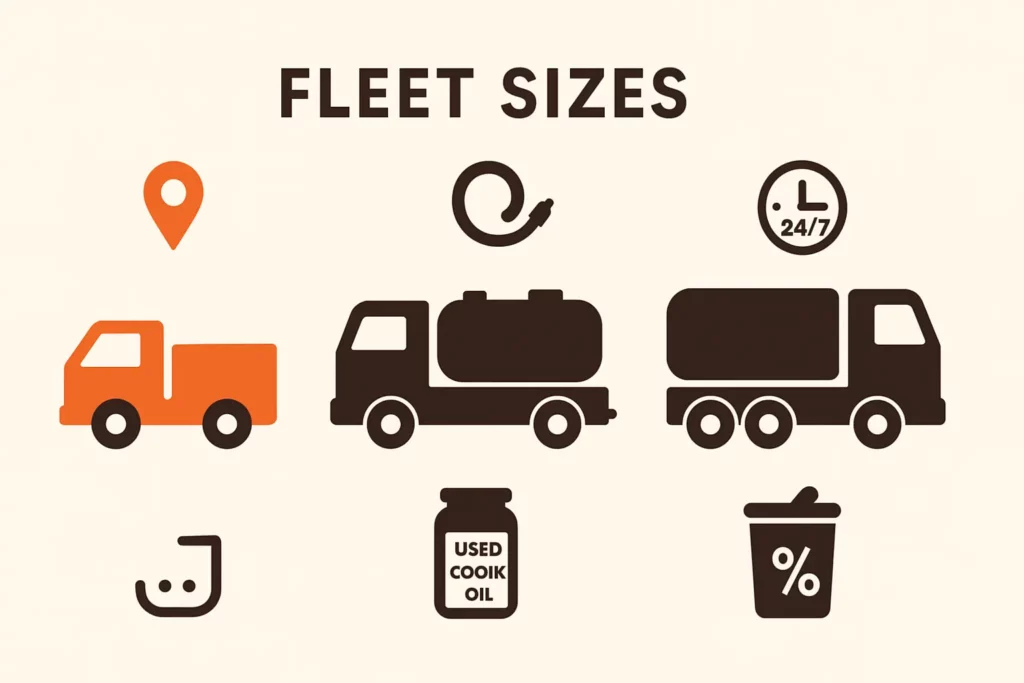
For commercial businesses, managing used cooking oil can be a daunting task. Restaurants and other businesses often generate gallons of used cooking oil, requiring specialized collection services. Fortunately, there are specialized services available to collect and recycle cooking oil, turning waste into a valuable resource. Contacting a local grease hauler for free cooking oil pickup services is a practical solution.
These services assist businesses in meeting environmental regulations while also promoting the production of biodiesel fuel and biofuels, a renewable energy source. One such company offering these services is Grease Connections, which also deals with greases.
Grease Connections
Grease Connections operates as a licensed hauler, providing specialized services for used cooking oil collection across major metropolitan areas in Florida. Businesses can schedule pickup services through licensed haulers like Grease Connections to efficiently manage large quantities of used cooking oil.
The booking process at Grease Connections allows businesses to manage pickup schedules online and receive automated documentation for each collection. This system ensures that businesses remain compliant with local regulations and can easily track their waste management practices.
Engaging a local grease hauler allows restaurants and other commercial establishments to ensure proper collection and repurposing of used cooking oil, supporting environmental sustainability and legal compliance.
Booking and Pickup Process
Scheduling pickup services with Grease Connections is simple and can be done online at GreaseConnections.com/florida. Customers can conveniently arrange pickups and manage waste disposal from their office.
Each scheduled pickup includes automated documentation, offering businesses an easy method to track waste management practices and ensure regulatory compliance.
Proper Disposal Techniques for Home Cooks
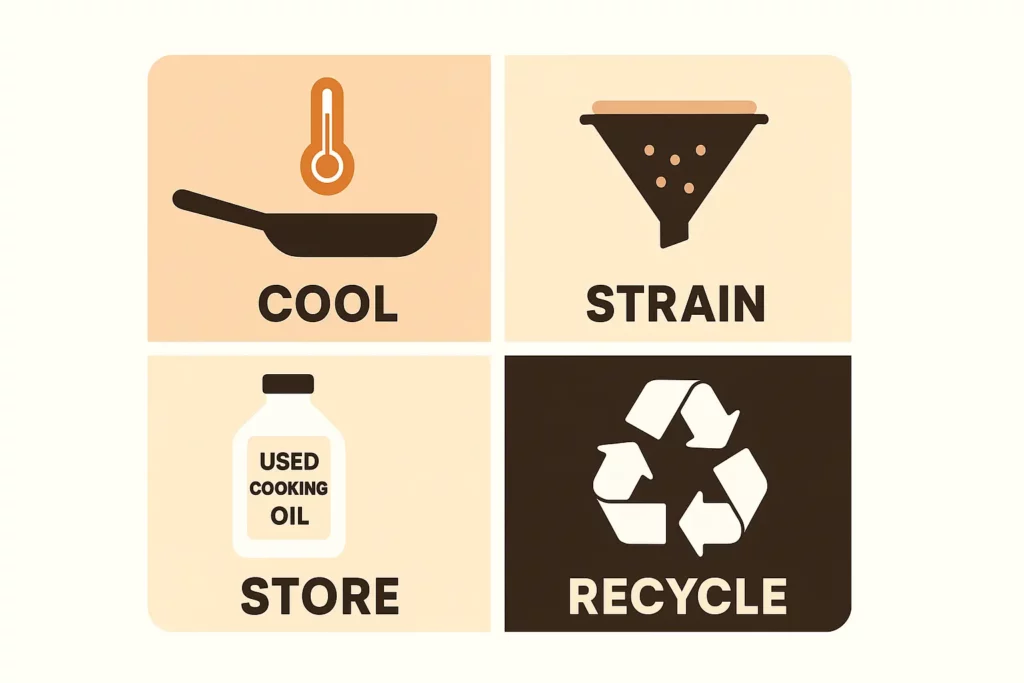
Home cooks also play a crucial role in the proper disposal of used cooking oil. Improper disposal can lead to clogged sewer pipes, street overflows, and environmental damage. Proper disposal of used cooking oil can prevent these issues and promote a cleaner environment.
There are several effective methods for disposing of used cooking oil at home, as well as cooking oil and grease from various sources, including cooling and storing the oil, avoiding the sink drain, and composting certain types of oil. Never dump used cooking oil and grease down the drain or on the ground, as this can cause plumbing problems and environmental harm. You can let the oil solidify in the freezer or store it in a jar before you throw it in the garbage or trash can. Once the oil is solid, it can stick to a surface or be more easily handled for disposal.
Cool and Store
After cooking, allow the oil to cool to a safe temperature before transferring it to a storage container, preventing accidents and easing handling.
Once cooled, store the oil in a clean container. Dispose of it in regular household trash or take it to a Household Hazardous Waste facility, ensuring safe containment and proper disposal.
Avoid the Sink Drain
Disposing of used cooking oil down the sink drain can cause:
- Significant plumbing issues
- Solidification of oil that clogs pipes
- Costly repairs
- Potential sewer overflows
Never pour used cooking oil or grease down the toilet either, as it can cause similar plumbing problems and blockages.
These problems also lead to environmental damage.
Instead, use greasy paper towels to wipe excess oil from pots and pans before thoroughly washing them with hot water and soap to remove any residual oil and grease. This simple measure prevents oil from entering the plumbing system and causing blockages. Additionally, using a paper towel can help absorb any remaining moisture.
Compost Cooking Oil
Some types of cooking oil can be composted, but it’s essential to know which ones are suitable for composting. Generally, vegetable oils can be composted in small quantities when mixed with other organic materials.
Mix cooking oil with food scraps and other compostable materials, ensuring non-organic materials are excluded to avoid contamination. When you cook, be mindful of what goes into your compost.
Composting cooking oil recycled into valuable garden nutrients promotes a sustainable and eco-friendly lifestyle.
Reuse and Recycling Options
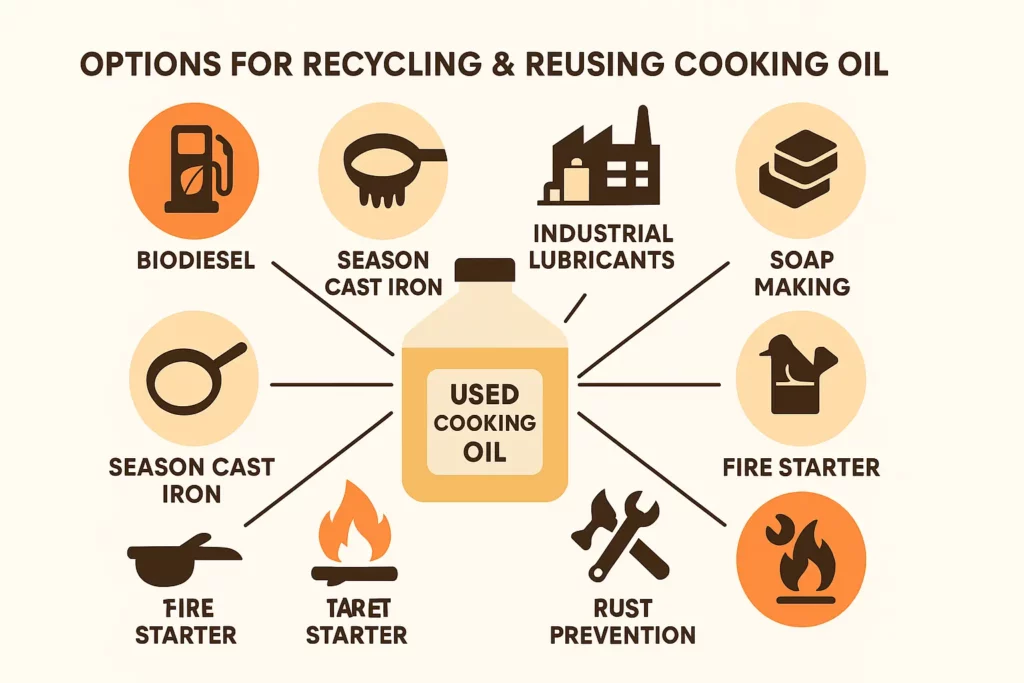
Reusing and recycling cooking oil offers several benefits, including reducing waste and providing a valuable resource for various purposes. There are multiple ways to recycle cooking oil, from filtering and reusing it to donating cooking oil recycled for biodiesel production.
Fats from bacon and butter can also be recycled or repurposed, not just vegetable oil. For example, bacon fat can be saved and used for roasting potatoes or frying eggs, while leftover butter can be collected and recycled alongside other cooking oils.
After deep frying, you can filter and reuse the oil if it is still in good condition. However, if the oil has become burned and is no longer suitable for cooking, do not pour it down the drain. Instead, consider recycling, safe disposal, or even using it as fuel. Used cooking oil and animal fats can also be used to produce soaps and other useful products, turning waste into valuable items.
Exploring these options maximizes the use of your used cooking oil and helps save a more sustainable environment.
Filter and Reuse Cooking Oil
Extend the life of cooking oil by letting it cool, filtering it through a mesh sieve or cheesecloth, and storing it in a sealed container. This removes food particles and impurities, enabling reuse for multiple cooking sessions.
Filtered cooking oil and vegetable oil can maintain quality for up to ten uses, offering a cost-effective and eco-friendly option for home cooks. Frying oil can also be a great choice for those looking to enhance their cooking experience with cooking oils and cooking fats.
Donation for Biodiesel
Donating used cooking oil for bio diesel production is another excellent way to recycle used oil. Biodiesel is a renewable fuel that can be used in diesel engines, reducing reliance on fossil fuels. Local companies may accept used cooking oil for this purpose, especially when collected in bulk.
Donating used cooking oil supports green energy production and contributes to a more sustainable future.
FryAway Solution
FryAway offers an innovative solution for disposing of used cooking oil by transforming it into a solid form suitable for organic waste. This product simplifies disposal, making it easier to pour and more convenient for home cooks.
By turning liquid cooking oil into a solid, FryAway helps solidify messes and ensures that the oil can be safely disposed of alongside other organic waste.
Environmental Impact and Legal Considerations
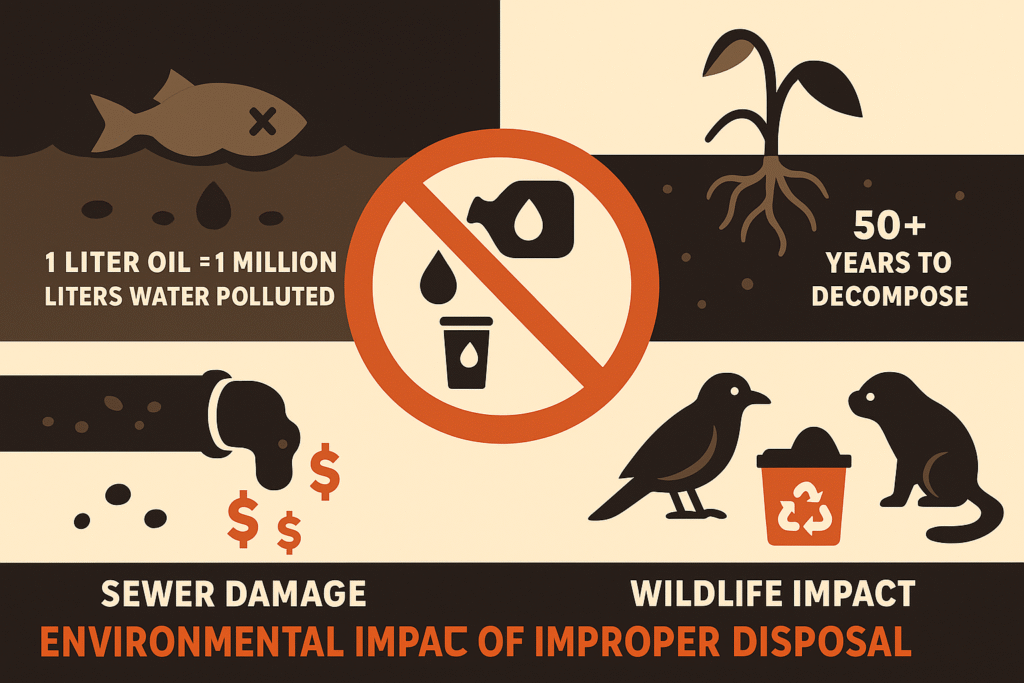
Improper disposal of used cooking oil can cause severe environmental impacts, including soil and water contamination. Pouring oil down the drain can block plumbing and sewage systems, causing significant damage.
Many people worry about the environmental and legal consequences of improper cooking oil disposal.
Restaurants and businesses must comply with local regulations by ensuring that their used cooking oil is picked up by a certified grease collection company. Failure to do so can result in legal penalties and environmental harm.
Environmental Protection Regulations
Regulations surrounding the disposal of used cooking oil are in place to protect the environment and public health. Improperly discarding oil contaminates soil and water, posing serious risks.
Landfilling or pouring used cooking oil into sewers is illegal and can contribute to severe environmental harm, including putting water pollution and wildlife damage.
Consequences of Improper Disposal
Improper disposal of cooking oil can lead to costly pipe repairs and environmental damage. Approximately 47% of sewer overflows are caused by fat and oil clogs, highlighting the importance of proper disposal.
Businesses that fail to comply with disposal regulations may face fines ranging from small amounts of money to thousands of dollars, with penalties for repeated violations reaching up to $5,000.
Summary
Proper disposal of used cooking oil is essential for protecting the environment and maintaining a healthy plumbing system. By utilizing residential drop-off locations, commercial collection services, and proper disposal techniques, you can contribute to a cleaner and more sustainable future. Remember, every small effort counts in making a significant impact.

